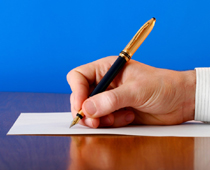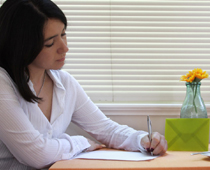| 1. |
You could send an informal letter to ____. 
|
||||||||
|
| 2. |
If you do not know the name of the person to whom you are sending the letter, how should you address it? 
|
||||||||
|
| 3. |
When should you use 'Yours sincerely,'? 
|
||||||||
|
| 4. |
What should you write at the top right-hand corner of a formal letter? 
|
||||||||
|
| 5. |
Besides addresses, what other information should go before the body (main section) of the letter? 
|
||||||||
|
| 6. |
The first paragraph of a formal letter will usually include which information? 
|
||||||||
|
| 7. |
If you write a formal letter in response to a job advertisement, you will be writing a ____. 
|
||||||||
|
| 8. |
Which of these would be out of place in an informal letter? 
|
||||||||
|
| 9. |
Where would you write the address on a postcard? 
|
||||||||
|
| 10. |
Both a letter of complaint and a persuasive letter should include which of the following? 
|
||||||||
|
